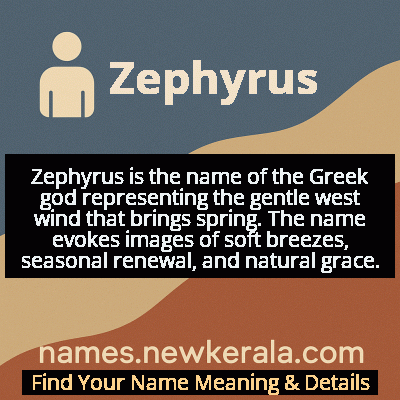Zephyrus Name Meaning & Details
Origin, Popularity, Numerology Analysis & Name Meaning of Zephyrus
Discover the origin, meaning, and cultural significance of the name ZEPHYRUS. Delve into its historical roots and explore the lasting impact it has had on communities and traditions.
Name
Zephyrus
Gender
Male
Origin
Greek
Lucky Number
3
Meaning of the Name - Zephyrus
Zephyrus is the name of the Greek god representing the gentle west wind that brings spring. The name evokes images of soft breezes, seasonal renewal, and natural grace.
Zephyrus - Complete Numerology Analysis
Your Numerology Number
Based on Pythagorean Numerology System
Ruling Planet
Jupiter
Positive Nature
Optimistic, inspirational, and creative.
Negative Traits
Scattered, exaggerating.
Lucky Colours
Yellow, gold, purple.
Lucky Days
Thursday.
Lucky Stones
Yellow sapphire.
Harmony Numbers
1, 2, 9.
Best Suited Professions
Arts, writing, communication.
What People Like About You
Creativity, optimism.
Famous People Named Zephyrus
Zephyrus of Greek Mythology
God/Deity
One of the four Anemoi (wind gods), personification of the gentle west wind that heralded spring
Zephyrinus (Pope)
Religious Leader
Served as Bishop of Rome from 199-217 AD, early Christian pope during Roman persecution
Zephyrus Teach
Pirate
Notorious pirate who operated in the Caribbean, known for his distinctive ship 'The West Wind'
Zephyrus Jones
Botanist
Renowned for his studies of wind-pollinated plants and atmospheric effects on vegetation
Name Variations & International Equivalents
Click on blue names to explore their detailed meanings. Gray names with will be available soon.
Cultural & Historical Significance
In various myths, Zephyrus appears as both benevolent and passionate. He famously competed with Apollo for the love of Hyacinth, and in some versions was responsible for the youth's death when his jealous wind blew a discus off course. He also married Chloris (Flora in Roman mythology), the goddess of flowers, making their union symbolic of spring's blossoming. This connection to fertility and renewal made Zephyrus an important figure in agricultural communities, where his favorable winds were invoked for successful harvests.
The cultural impact of Zephyrus extended beyond ancient Greece into Roman culture (as Favonius) and later European art and literature. Renaissance painters often depicted him as a youthful, winged figure scattering flowers, while poets from Ovid to Shakespeare used him as a symbol of gentle influence and seasonal change. His legacy persists in modern times through the word 'zephyr,' which continues to denote a soft, gentle breeze in English and other languages.
Extended Personality Analysis
Individuals named Zephyrus are typically associated with gentle, creative, and free-spirited personalities. Like the west wind they're named after, they often exhibit a calming presence and natural grace that puts others at ease. They tend to be imaginative and artistic, with an appreciation for beauty in all forms, from nature to human expression. Their temperament is usually balanced and harmonious, though they can display sudden bursts of passion or intensity when inspired or provoked.
Zephyrus-named individuals often possess an innate connection to nature and environmental awareness, reflecting their mythological roots. They're typically adaptable and flexible in their thinking, able to navigate changing circumstances with the ease of the wind. While generally peaceful, they can be fiercely protective of those they love and the ideals they hold dear. Their communication style tends to be persuasive and gentle rather than forceful, winning others over through charm and reason rather than aggression.
These individuals often excel in creative fields, diplomacy, or environmental work where their natural grace and persuasive abilities can shine. They may struggle with routine or confinement, needing space to explore and create. Their emotional depth combined with their gentle exterior makes them complex individuals who can weather emotional storms while maintaining their essential calm nature, much like the steady west wind that persists through changing seasons.
Modern Usage & Popularity
In contemporary times, Zephyrus remains a rare but meaningful choice, primarily used by parents seeking unique mythological names with positive connotations. While not appearing on mainstream popularity charts, it has seen a slight increase in usage among families interested in Greek mythology, nature-inspired names, or those seeking alternatives to more common 'Z' names like Zachary or Zane. The name is particularly popular in artistic and academic circles where classical references are appreciated. Its modern appeal lies in its combination of ancient heritage with the gentle, environmental imagery of breezes and spring renewal. The shortened form 'Zephyr' is somewhat more common and has gained traction as a unisex name, while 'Zephyrus' maintains its classical masculine identity. Recent years have shown growing interest in mythological names overall, positioning Zephyrus for potential increased usage among parents looking for distinctive yet meaningful names.
Symbolic & Spiritual Meanings
Symbolically, Zephyrus represents transformation, gentle change, and the breath of life. As the west wind, he embodies the transition from winter to spring—a metaphor for renewal, hope, and new beginnings. His gentle nature symbolizes peaceful influence and the power of subtle persuasion over brute force. The wind he represents carries seeds for new growth, making him a symbol of fertility, creativity, and the dissemination of ideas. In broader terms, Zephyrus signifies the invisible forces that shape our world—those gentle, persistent influences that ultimately bring about significant change through patience rather than violence.
Metaphorically, Zephyrus represents the carrying of messages, inspiration, and cultural exchange across boundaries. His winds that travel from west to east symbolize the transmission of knowledge and the spreading of influence. In psychological terms, he can represent the animus or life force that moves through consciousness, bringing inspiration and emotional renewal. The contrast between his gentle spring breezes and his occasional stormy passions in mythology makes him a complex symbol of the dual nature of influence—both nurturing and potentially destructive when provoked, much like the creative process itself that can gently inspire or violently transform.

